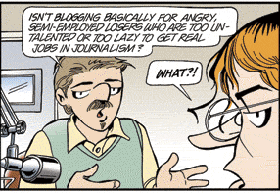
For a while now I have been thinking how weird it is that we talk about ICT as Information and Communication Technology . I am starting to think that we should be a little more creative in the way that we use ICT and maybe we need to start with the title. Perhaps, this is a good time to change the 'I' in ICT to Imagination and Communication Technology. We should be attempting to get learners to imagine the best use of the technology and to imagine themselves in a new way - what is their web 'prescence'? what is the profile that they leave on the web?
I do find that (and maybe this is a peculiar Northern Irish thing) children today are NOT good at following through the potential of what the technology actually creates. For example, they will spend more time on bebo writing comments to their mates than they will actually typing up a piece of homework. They will spend an hour having an MSN chat with a mate - when the same content could have been covered it they had actually picked up the phone and spoken for 5 minutes! And, dont even get me started about text messaging! The fact that they are communicating and networking socially is good - but is it enough? How does learning fit into this?
I think that teachers are essential in opening up the amazing world of ICT to students and showing how this web can be used to enhance their learning and their imaginations. How can we make learning fun? How can we make the actual process of knowing how to use and communicate through a computer, not just fun but something that makes the kids rush home and boot up their computers!
I think I might address a few ideas about imagination in ICT in my next few posts!








